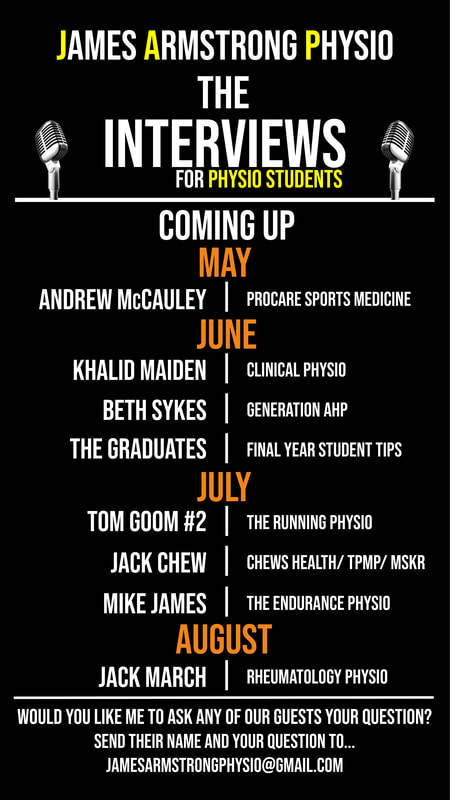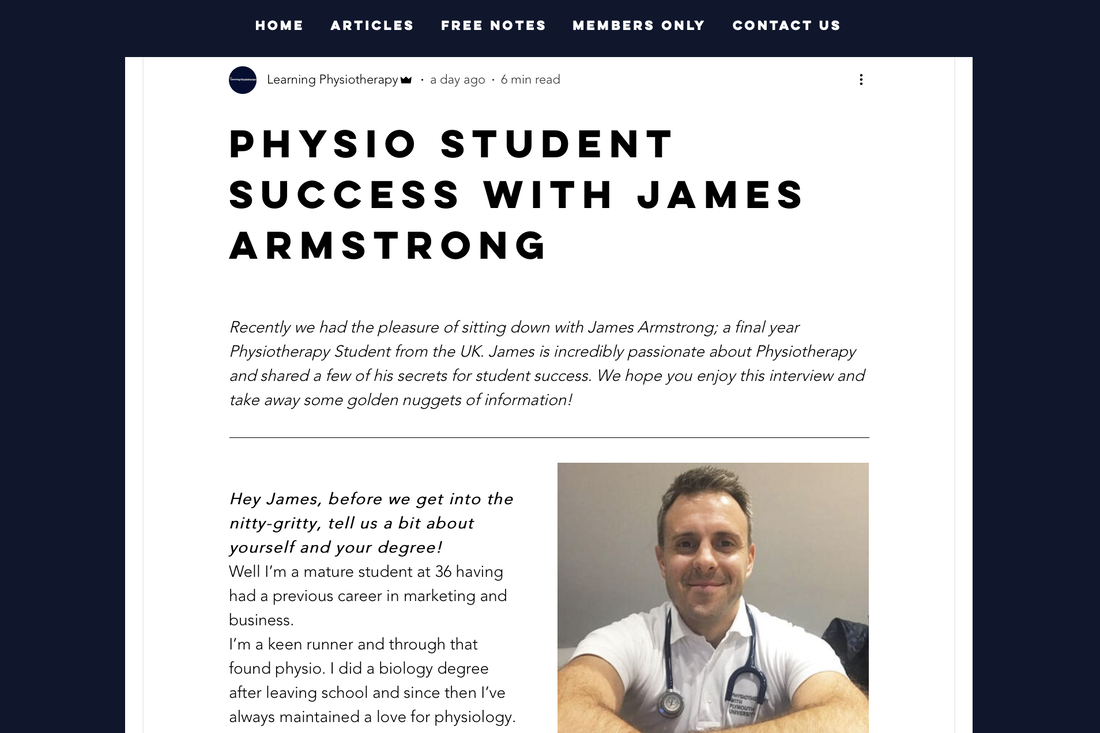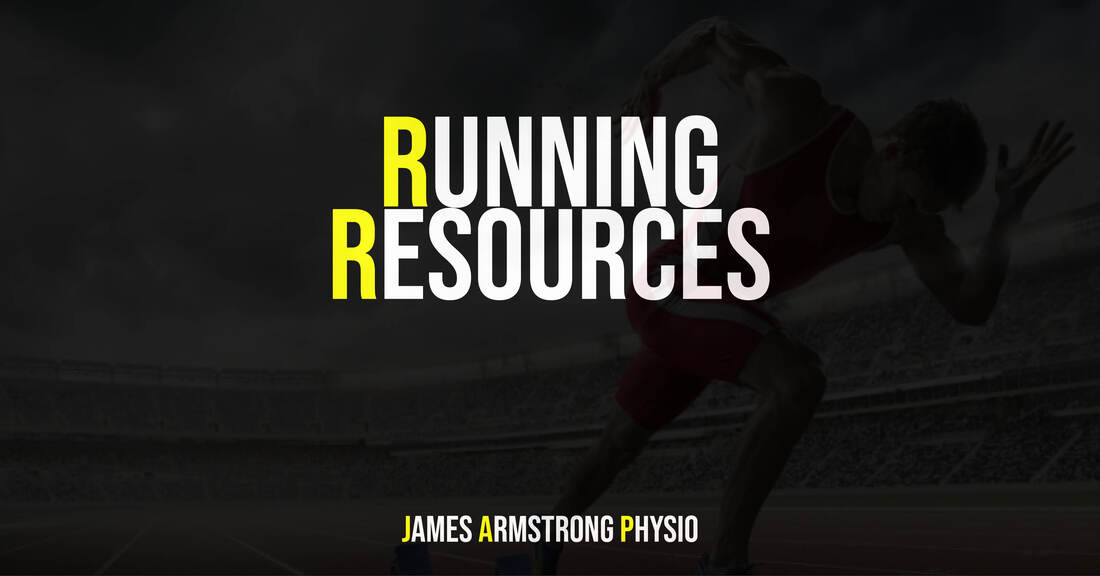Three months of Stella physiotherapy guests
0 Comments
The interview in full:
Hey James, before we get into the nitty-gritty, tell us a bit about yourself and your degree! Well I’m a mature student at 36 having had a previous career in marketing and business. I’m a keen runner and through that found physio. I did a biology degree after leaving school and since then I’ve always maintained a love for physiology. I did sports massage qualifications and just never thought I’d be able to do physio. Eventually, I realised I loved helping people but knew that sports massage had a very limited scope and I wanted to pursue a career in treating people in pain. I eventually took the plunge and applied to go back to university to start my journey towards becoming a physiotherapist! At the same time my fiancée (Jodi) and I moved to Devon! I’ve not looked back, it’s been the best thing I have ever done in my life except meeting Jodi of course 😆 I’ve found that Physiotherapy is even bigger than I thought. I’ve fallen in love with acute care and neuro but most exciting of all I have now idea where I’ll take my physio career. I successfully secured a job as a Band 5 rotational physio at my local acute hospital to start soon (sooner than expected on with the temp register). I am super passionate about the profession and feel ever so lucky to have found it. Last year I started a YouTube channel to share my experiences and reflections and this has grown in to something bigger! I recently dabbled in interviewing with my first interview with Tom Goom! 1. Do you have any tips for learning the large amount of content covered in the PT degree? Don’t panic and take breaks. You will often feel overwhelmed by the sheer amount you need to know and understand. You’ll think “how am I possibly going to learn this”. You will. Take it bit by bit and break up your study with things you enjoy. A run, the gym, playing for a sports team or seeing friends. A happy physio student is a productive physio student. Also experiment with different study techniques and find what works for you, we’re all different. 2. How can students perform better on clinical placement? Easily the biggest thing on clinical placement is don’t be afraid of getting things wrong! You’re a physio student not a Band 6! You’re there to learn, put your knowledge into practice but learn from it. It’s when we make little mistakes that we learn huge amounts. Dive in, enjoy it, listen to your educators and the team and grow as a clinician. 3. What is your dissertation about? My dissertation is a qualitative study titled “An exploration of informal carer’s experiences of belonging to a Parkinson’s carer support group” we work as a group and it’s been incredible. 4. What is your dream PT job? Right now I don’t have one. I’ve realised that a Physiotherapy degree gives you a tremendous amount of options and I’m excited to not know where I’ll end up. I’ve loved every placement and every module so far. I start my Band 5 rotational Physio post very soon and I’m sure that will give me further insight into what I may end up specialising in. 5. Any tips for studying at home? Structure and to-do lists. Keeping some structure to your day is vital. Wake up at the same time, get dressed, have a proper breakfast and split uni work into bite sized chunks and enjoy some physical activity. Make time to connect with family and friends every day, human contact is important to us Homo Sapiens! Make a to-do list! They are super effective at getting things done but also they're really motivating as you get to cross things off. Prioritisation helps you ensure you get the important things done first, and it is also a vital skill as a Physiotherapist. 6. How do you prepare for written exams? My main aim for written exams is to ensure I really understand the subject. I don’t prepare to pass an exam I prepare to know the subject. I also don’t just learn parrot fashion. I enjoy the time to learn everything there is to know about what we’re covering. I then create flash cards so I can take them places. I used to take them when walking the dog so I could test myself or explain to the woods a certain pathology or evidence base. I’ve even attached ABG flash card to the lawn mower. Efficient use of my time haha! I also tell my fiancee about what I’ve learnt that day. Even if she’s not listening completely I find the process of explaining it out loud really cements what I’ve learnt. In your first year experiment with different revision methods and find what works for you. 7. Any tips for studying a subject you don’t enjoy? This is tough. I’ve been incredibly lucky and not had many experiences of not enjoying a subject within my physio degree. When I do lose my mojo I find increasing breaks helps. I try to think hard about how that subject is going to make me a better physio. There’s always a reason for covering what we do at university. Also talk to your lecturers/tutors and be honest. It’s amazing how they can flip most things in to a positive and help support you through tough times. I often think to myself, 'students don’t use their university lectures enough.' 8. Keys for getting a PT job whilst still at uni? Be proactive and put yourself out there. Jobs in the UK tend to start coming out anytime from January although I was able to apply in December. You’ll never feel completely ready while at university to apply but you have to remember you’ve not finished the degree so why should you feel 100% ready!? Also the people interviewing you will know you're still a student and that you’ve not finished. Have other extracurricular activities under your belt. That might be volunteering at a local Parkinson’s exercise group, being on a society committee, or getting some bank work as a physio assistant or health care assistant. It will all give you further skills including communication, organisation, time management, prioritisation, dealing with difficult situations plus many more. These are all things that may be covered in the personal statement and asked at an interview. Lastly, write reflections of situations, experiences and definitely of placements. Drawing upon these will help you so much when writing the personal statement and preparing for interview. I filmed a video all about applying for your first Physiotherapy job which I’ve had great feedback from. https://youtu.be/ykLPV8a4b9E 9. What have you found the hardest during your degree? By far it's been essays. I'm not a strong academic writer and it's been 13 years since I did my first degree. I've had to work hard and remain focused. I find that if something is hard work I tend to shy away from it, so I had to make myself knuckle down for essays. I did however find that I learnt loads from them. All of the research, reading journal articles and putting together a concise appraisal of said research really helped me learn. I always told myself if the grade for the essay isn't quite what I wanted then the main thing is that I have learnt what I was supposed to learn. 10. What is your favourite memorisation technique for study? To fully understand the subject/piece of anatomy/pathology or what ever you're trying to memorise. To learn something parrot fashion is fine but to understand something fully means it will truly stick and let’s face it you need this knowledge to stick for when you start as a qualified physio. It means that although you won’t remember it a few weeks after the exam, when you do revisit the area you’ll have that understanding to facilitate the flooding back of memory. One method I’ve used to good effect are flash cards. However it is very individual. Try different things and find one that works for you. We'd like to thank James for his time and great insights! Check out his website: http://www.jamesarmstrongphysio.com/ Instagram: https://www.instagram.com/james_armstrong_physio/?hl=en YouTube Channel: https://www.youtube.com/channel/UCXwkOwklO4OCOlGiPIUxouw
The interview with Tom Goom is for any Physio Students, newly qualified physios and those about to start their Physiotherapy degree. We cover so much around Physiotherapy that will help improve your Physio Student experience and excel in clinical practice. Grab a comfy seat, notebook and pen and enjoy!
|
AuthorJames Armstrong Archives
May 2024
Categories |


 RSS Feed
RSS Feed
